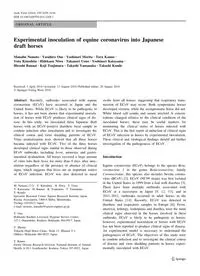
2014 Experimental inoculation of equine coronavirus into Japanese draft horses PDF
Preview 2014 Experimental inoculation of equine coronavirus into Japanese draft horses
ORIGINAL ARTICLE Experimental inoculation of equine coronavirus into Japanese draft horses Manabu Nemoto • Yasuhiro Oue • Yoshinori Morita • Toru Kanno • Yuta Kinoshita • Hidekazu Niwa • Takanori Ueno • Yoshinari Katayama • Hiroshi Bannai • Koji Tsujimura • Takashi Yamanaka • Takashi Kondo Received: 3 April 2014 / Accepted: 13 August 2014 / Published online: 20 August 2014 � Springer-Verlag Wien 2014 Abstract Recently, outbreaks associated with equine coronavirus (ECoV) have occurred in Japan and the United States. While ECoV is likely to be pathogenic to horses, it has not been shown that experimental inocula- tion of horses with ECoV produces clinical signs of dis- ease. In this study, we inoculated three Japanese draft horses with an ECoV-positive diarrheic fecal sample to confirm infection after inoculation and to investigate the clinical course and virus shedding patterns of ECoV. Virus neutralization tests showed that all three horses became infected with ECoV. Two of the three horses developed clinical signs similar to those observed during ECoV outbreaks, including fever, anorexia, and gastro- intestinal dysfunction. All horses excreted a large amount of virus into their feces for more than 9 days after inoc- ulation regardless of the presence or absence of clinical signs, which suggests that feces are an important source of ECoV infection. ECoV was also detected in nasal swabs from all horses, suggesting that respiratory trans- mission of ECoV may occur. Both symptomatic horses developed viremia, while the asymptomatic horse did not. White blood cell counts and serum amyloid A concen- trations changed relative to the clinical condition of the inoculated horses; these may be useful markers for monitoring the clinical status of horses infected with ECoV. This is the first report of induction of clinical signs of ECoV infection in horses by experimental inoculation. These clinical and virological findings should aid further investigation of the pathogenesis of ECoV. Introduction Equine coronavirus (ECoV) belongs to the species Beta- coronavirus 1 in the genus Betacoronavirus, family Coronaviridae; this species also includes bovine corona- virus (BCoV) [2]. ECoV (NC99 strain) was first isolated in the United States in 1999 from a foal with diarrhea [3]. There have been multiple outbreaks associated with ECoV at a racecourse in Japan [9, 12, 13], and in 2011–2012, outbreaks occurred in adult horses in the United States [14]. Recently, ECoV was detected in diarrheic and respiratory samples in Europe [8]. Fever, anorexia, lethargy, leukopenia and diarrhea were the main clinical signs observed in the horses involved in these outbreaks. ECoV is likely to be pathogenic to horses; however, experimental inoculation of horses with ECoV has not been reported to produce clinical signs of disease. An experimental model is necessary to understand the pathogenesis of ECoV. The objectives of this study were to confirm infection and to investigate the clinical course of disease and virus shedding patterns in horses experi- mentally inoculated with ECoV. M. Nemoto (&) � Y. Kinoshita � H. Niwa � T. Ueno � Y. Katayama � H. Bannai � K. Tsujimura � T. Yamanaka � T. Kondo Epizootic Research Center, Equine Research Institute, Japan Racing Association, 1400-4 Shiba, Shimotsuke, Tochigi 329-0412, Japan e-mail:
